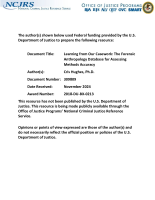Community resources
Race and Ethnicity: What Are Their Roles in Gang Membership?
Changing Course: Preventing Gang Membership, Conclusion: An Invitation To Contribute to Gang-Joining
Identifying the Scope and Context of Missing and/or Murdered Indigenous Persons (MMIP) in New Mexico and Improving MMIP Data Collection, Analysis, and Reporting
Natural Variation in Genome Architecture Among 205 Drosophila Melanogaster Genetic Reference Panel Lines
An Evaluation of a Statewide Approach to the Prevention and Intervention of Violence Using School Threat Assessment Teams
NIJ Quick Response: Assessment of the Oasis Project in Louisville, Kentucky, Draft Final Report
Studies of Mistreatment of Older Adults Offer Solutions to an Urgent and Growing Societal Problem
Aging populations face abuse in many forms, and the search for data-driven solutions has lagged. New NIJ-backed projects offer answers derived from other research areas.
Learning from Our Casework: The Forensic Anthropology Database for Assessing Methods Accuracy
Law Enforcement Response to Persons with Intellectual and Developmental Disabilities Identifying High-Priority Needs to Improve Law Enforcement Strategies
Just Science Podcast: Just Rapidly Identifying Drugs Involved in Suspected Overdoses
Just Science Podcast: Just Public Health and Safety Data Sharing in Georgia
Philosophies in Community Supervision of Gang-Involved Youth and Adults
Importance of culture in measuring tribal crime seriousness: scoping review of crime seriousness indices
Necrobiome Framework for Bridging Decomposition Ecology of Autotrophically and Heterotrophically Derived Organic Matter
Sharing the Monopoly on Violence? Shall-Issue Concealed Handgun License Laws and Responsibilization
Are Microbiome Studies Ready for Hypothesis-Driven Research?
Alcohol and Drug Monitoring for Community Supervision
Meeting the Ongoing, Urgent, Unmet Needs of Uvalde Residents After the Robb Elementary School Shooting
Caring Connections for Youth: Evaluation of a Countywide Pre-Arrest Diversion Initiative to Reduce Racial/Ethnic Disparities
Assessing Solvability Factors in Missing Person Cases: A Mixed-Method Approach
Meeting People Where They Are to Improve Institutional Culture
Incarcerated individuals deserve opportunities for healing and growth, but they often lack the necessary resources for such opportunities. Additionally, organizational cultures that don’t support these outcomes often stand in the way. Researchers and practitioners gathered at NIJ’s 2023 National Research Conference to share ideas and projects that will increase opportunities for incarcerated populations around the country. This show continues their conversation.






